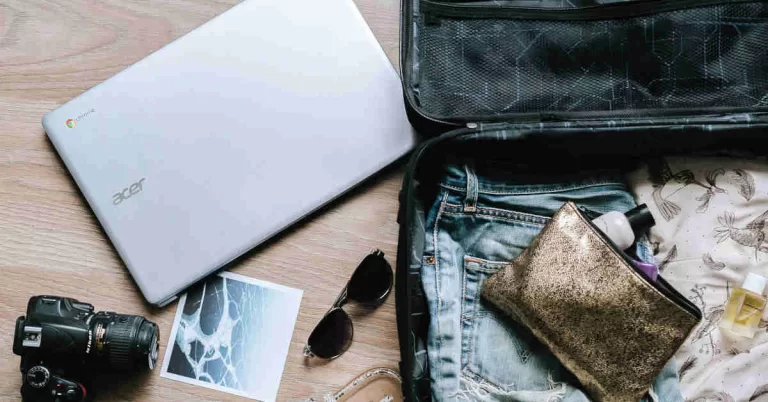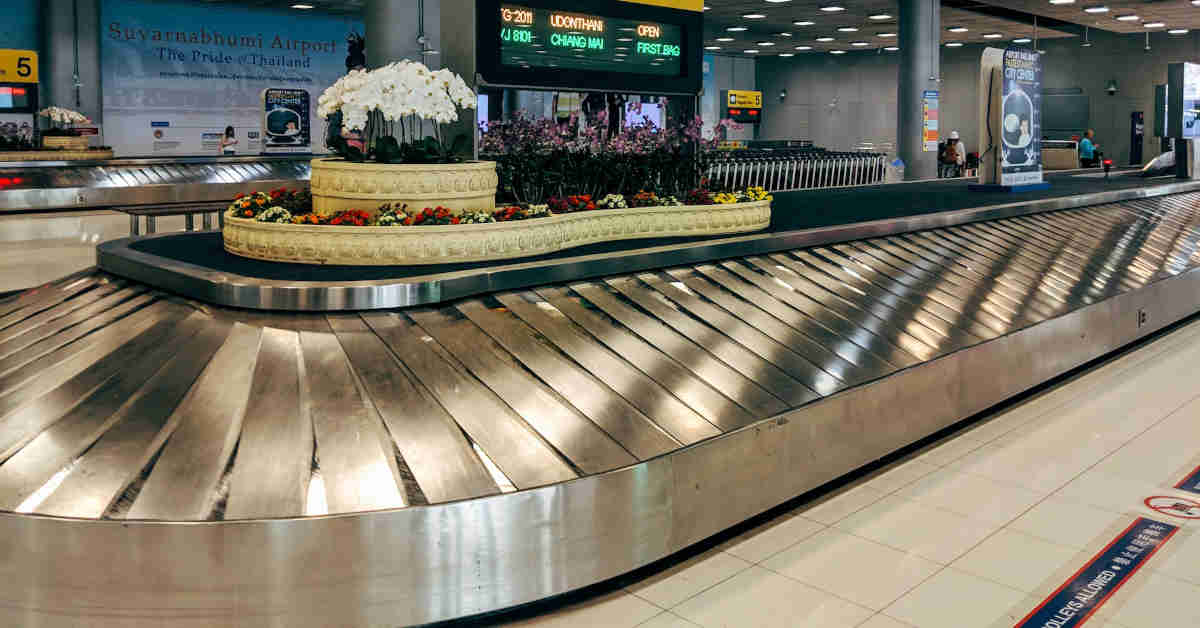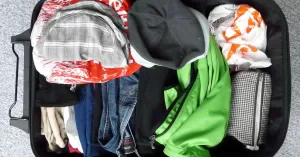Packing for a trip can be a stressful experience, especially when it comes to deciding what items to bring with you. When flying, you have two options for your belongings: checking your bags or carrying them on the plane. While checking your bags can be more convenient, it’s important to be mindful of what you pack. There are certain items that should never be put in your checked bag.
In this blog post, we’ll discuss some of the most important items you should always keep with you in your carry-on. To be clear, all these items can be packed in your checked bag, but it’s considered unwise to do so.
There are items that are restricted or prohibited from your checked baggage, either by the Transportation Security Administration (TSA) or your airline. We’ll leave that discussion for another blog post.
Reasons to Not Pack Items in Your Checked Bag
Before we drill down into specific categories of items, let’s discuss general reasons why you shouldn’t pack certain things in your checked bag. By understanding why items should not be placed in your luggage, you’ll be able to make a judgement call for any item that you may want to bring with you.
If there is a compelling reason not to pack an item in your checked bag, it’s probably a good candidate for your carry-on bag, or to be carried on your person. Alternatively, consider if the item is vital to your trip. You could leave it safely at home.
Your Checked Bag Could Be Delayed or Lost
Unfortunately, checked baggage is sometimes delayed or lost during transit. This can result in a frustrating and stressful experience, especially if you need the items that you packed in your checked bag. Airlines will typically do their best to reunite you with your lost luggage, but this can take time, and there is always the risk that your belongings could be lost forever.
Your Item May Get Damaged
Checking your baggage can also result in damage to your items during transit. The handling process can be rough, and your luggage may be thrown around, resulting in scratches, dents, or other damage to your valuable items.
Limited Access to Your Item
When you pack items in your checked bag, you won’t have access to them during the flight. This can be especially problematic if you need to access medications, electronic devices, or other essential items during the trip. Additionally, if your checked bag is delayed or lost, you may not be able to access your belongings until your bag is found.
Security Concerns
When you pack items in your checked baggage, you have no control over who handles your luggage and what happens to your belongings during the journey. TSA has the right to inspect any checked baggage, and they may choose to open your bag and examine its contents. This means that your personal items could be handled by strangers, and sensitive or private items could be at risk of theft or damage.
Additionally, checked baggage is screened by X-ray machines, which can damage items such as film.
Items Can Be Stolen
Your checked baggage may also be at risk of theft.
Baggage handlers, ground crew, and even other passengers may have access to your luggage during transit.
If you pack valuable items in your checked baggage, you risk them being stolen.
Insurance Coverage
Airlines typically offer limited insurance coverage for lost or damaged baggage. The coverage is usually limited to a certain amount per item and may not cover the full value of your items. If you pack valuable items in your checked baggage, you risk losing them and not receiving full compensation.
Limited Release of Liability
There are certain items that require a limited release of liability form to be signed by the passenger. The purpose of this form is to protect the airline from any potential liability in the event of damage or loss of the item during transit. What this means is that if the item is delayed, damaged, or lost, you have very limited recourse for compensation.
Airlines have a comprehensive list of typical items that they assume no responsibility or liability for. This is usually found in their contract-of-carriage (a link to this document is normally located at the bottom of your airline’s website.
Typical items include:
- Valuables
- Fragile items
- Perishable goods
- Sports equipment packed in a soft-sided case
- Musical instruments
What is a Contract of Carriage?
A contract-of-carriage is a legal document that outlines the terms and conditions of air travel, including the rights and responsibilities of both the airline and the passenger. It typically covers topics such as ticketing, boarding, baggage, delays, cancellations, and compensation.
Delays In Compensation
Even if the airline does offer compensation for lost or damaged baggage, the process can be long and complicated. It can take weeks or even months to receive compensation, during which time you will be without your valuable items.
Items Affected by Temperature Changes
Many types of items can be affected by dramatic changes in temperature. Examples of items that could be impacted include perishable food, medications, toiletries, and electronics.
One of the biggest risks of packing medications in checked baggage is exposure to temperature changes. During a flight, the temperature in the cargo hold can fluctuate significantly.
Items That You Should Not Pack in Your Checked Bag
All the following items have one thing in common: airlines are not responsible for or liable for them.
Travel Documents
Important documents like your passport, visa, ID, and flight tickets should always be kept with you in your carry-on. This ensures that you have access to them in case of an emergency or if your checked bag gets lost.
Hot Tip: It’s a good idea to make copies of your important documents and keep them in a separate location, just in case.
Valuable Items
This includes items such as jewelry, expensive watches, cameras, and laptops. These items are often high-value and irreplaceable, making them prime targets for theft. It’s also important to remember that checked bags can get lost or damaged in transit. To keep your valuables safe, it’s best to keep them in your carry-on where you can always keep an eye on them.
Electronics
In addition to your valuables, it’s also a good idea to keep all electronics in your carry-on. Devices like laptops and cameras are fragile and expensive. Other electronic items such as your phone, tablet, e-reader, and noise-cancelling headphones can provide entertainment and comfort during a long flight.
Medications
If you rely on prescription medications, it’s essential that you keep them with you on the plane. You never know when your checked bag may get delayed or lost, and the last thing you want is to be without your medication when you need it.
Hot Tip: Make sure to pack enough medication to last the duration of your trip and bring along any relevant prescriptions or medical documentation.
Liquids
While liquids in checked baggage aren’t as restricted as they are in carry-on bags, they can still be a problem. Bottles and containers can leak, spilling their contents and damaging other items in your baggage. The change of pressure in the plane’s hold can also cause some liquids to burst or explode.
Hot Tip: If you do plan to travel with liquids in your checked bag, ensure that the container is properly sealed. It’s also a good idea to pack liquid containers in a resealable plastic bag, in the event that it leaks. make sure that the container has adequate cushioning to withstand knocks from your bag being moved by baggage handlers.
Perishable Items
Perishable foods such as fruits, vegetables, and dairy products should not be packed in your checked baggage as they can spoil or cause a mess during transit. If you need to bring these items with you, it’s best to keep them in your carry-on baggage.
Fragile Items
Fragile items such as glassware, ceramics, and artwork are considered to be high-risk items that are more likely to break during transit.
Irreplaceable Items
Sentimental items such as family photos and heirlooms can also be damaged during the baggage handling process, so it’s best to keep them with you at all times.
Final Thoughts
Let’s quickly summarize what to ask yourself when deciding if you should pack an item in your checked bag:
- Is the item a travel or official document?
- Is the item valuable (either monetary or sentimental)?
- Is the item fragile?
- Is the item perishable?
- Will you need the item during your flight?
- Is it critical that the item be available as soon as you arrive at your destination?
If you answered yes to any of these questions, then the item probably belongs in your carry-on bag.
Another compelling reason to not pack these types of items in your checked bag is that your airline will not assume any responsibility or liability for their delay, damage, or loss.



